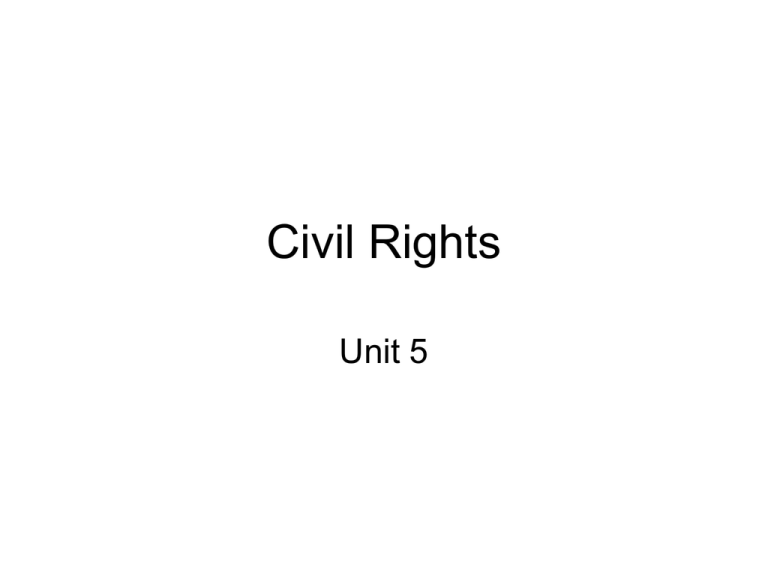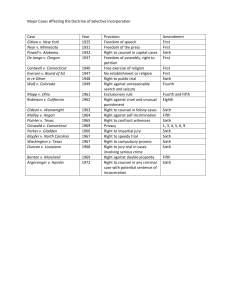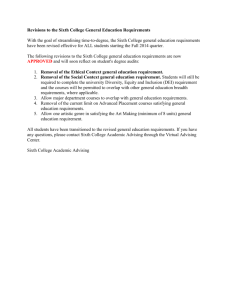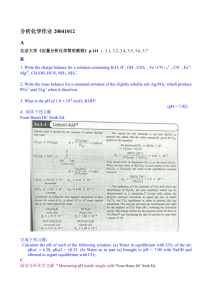Civil Rights
advertisement

Civil Rights Unit 5 Civil Rights Key Questions/Ideas Areas of Study • • • • • • Equality and Equal Rights • The Quest for Equal Justice Equal Protection of the Laws • Voting Rights • Rights To Equal Access Education Rights • • • • • • How can the government best ensure equal rights for all? Why is the Supreme Court so important in determining civil rights? Explain the concept of equality and assess the rights of citizens. Compare and contrast the efforts of various groups to obtain equal protection of the laws. Analyze the Supreme Court’s three-tiered approach used to evaluate discriminatory laws. Trace the evolution of voting rights and analyze the protections provided by the 1965 Voting Rights Act. Describe congressional legislation against discrimination in housing, employment, and accommodations. Evaluate the historical process of school integration and the current state of affirmative action. Asses the status of civil rights in the US today. The story of civil rights in the US is the struggle to reconcile our ideals as a nation with the realities of discrimination individuals and groups may still encounter in daily life. IN CONGRESS, July 4, 1776. The unanimous Declaration of the thirteen united States of America, When in the Course of human events, it becomes necessary for one people to dissolve the political bands which have connected them with another, and to assume among the powers of the earth, the separate and equal station to which the Laws of Nature and of Nature's God entitle them, a decent respect to the opinions of mankind requires that they should declare the causes which impel them to the separation. We hold these truths to be self-evident, that all men are created equal, that they are endowed by their Creator with certain unalienable Rights, that among these are Life, Liberty and the pursuit of Happiness.--That to secure these rights, Governments are instituted among Men, deriving their just powers from the consent of the governed, --That whenever any Form of Government becomes destructive of these ends, it is the Right of the People to alter or to abolish it, and to institute new Government, laying its foundation on such principles and organizing its powers in such form, as to them shall seem most likely to effect their Safety and Happiness. Prudence, indeed, will dictate that Governments long established should not be changed for light and transient causes; and accordingly all experience hath shewn, that mankind are more disposed to suffer, while evils are sufferable, than to right themselves by abolishing the forms to which they are accustomed. But when a long train of abuses and usurpations, pursuing invariably the same Object evinces a design to reduce them under absolute Despotism, it is their right, it is their duty, to throw off such Government, and to provide new Guards for their future security.--Such has been the patient sufferance of these Colonies; and such is now the necessity which constrains them to alter their former Systems of Government. The history of the present King of Great Britain is a history of repeated injuries and usurpations, all having in direct object the establishment of an absolute Tyranny over these States. To prove this, let Facts be submitted to a candid world. • Civil Liberties – • Civil Rights – AMENDMENT XIV Section 1. All persons born or naturalized in the United States, and subject to the jurisdiction thereof, are citizens of the United States and of the State wherein they reside. No State shall make or enforce any law which shall abridge the privileges or immunities of citizens of the United States; nor shall any State deprive any person of life, liberty, or property, without due process of law; nor deny to any person within its jurisdiction the equal protection of the laws. Incorporation Case Year Provision Amendment Gitlow v. New York 1925 Freedom of speech First Near v. Minnesota 1931 Freedom of the press First Powell v. Alabama 1932 Right to counsel in capital cases Sixth De Jonge v. Oregon 1937 Freedom of assembly, right to petition First Cantwell v. Connecticut 1940 Free exercise of religion First Everson v. Board of Education 1947 No establishment of religion First In re Oliver 1948 Right to public trial Sixth Wolf v. Colorado 1949 Right against unreasonable search and seizure Fourth Mapp v. Ohio 1961 Exclusionary rule Fourth (and Fifth h) Robinson v. California 1962 Right against cruel and unusual punishment Eighth Gideon v. Wainwright 1963 Right to counsel in felony cases Sixth Malloy v. Hogan 1964 Right against self-incrimination Fifth h Pointer v. Texas 1965 Right to confront witnesses Sixth Griswold v. Connecticut 1965 Privacy First, Third, Fourth, Fifth, Sixth, and Ninth Parker v. Gladden 1966 Right to impartial jury Sixth Klopfer v. North Carolina 1967 Right to speedy trial Sixth Washington v. Texas 1967 Right to compulsory process Sixth Duncan v. Louisiana 1968 Right to jury trial in cases involving serious crime Sixth Benton v. Maryland 1969 Right against double jeopardy Fifth h Argersinger v. Hamlin 1972 Right to counsel in any criminal case with potential sentence of incarceration Sixth







